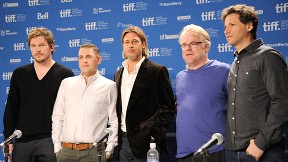This post is dedicated to a real ’49er …
- Jamie Moyer, who turns 50 on November 18, signed a minor-league deal with the Rockies with an invitation to Spring Training. Not that my expectations would be sky high, but I would have been curious to see Moyer, recovered from Tommy John surgery, in a Dodger uniform in March.
- Here, The Platoon Advantage needs only four degrees of separation to connect Moyer to Babe Ruth and makes the case for six degrees between Moyer and Cap Anson.
- Want to know what potential Dodger bidder Mark Cuban is up to this week? Just trying to change the business model of TV distribution.
- Ramona Shelburne of ESPNLosAngeles.com spoke to Cuban this week about why he’s interested in the Dodgers. “It’s an iconic team,” Cuban said. “There’s only a few franchises like that. And it’s always better to buy a team like that when they’re down.”
- Bill Shaikin of the Times does the most thorough look of anyone yet at the threat of Frank McCourt keeping possession of the parking-lot-infused land surrounding Dodger Stadium. Because McCourt’s agreement with MLB doesn’t require him to sell that land, he can use it as a bargaining chip to extract more purchase money, hang on to it and draw millions in lease revenue from it, or do the very thing we imagined he’d do when he first bought the Dodgers eight years ago, develop it.
As I’ve said in the past, though there’s a risk that some group will buy the Dodgers without the land, no one with the sense of a bullfrog should be willing to take the risk of remaining beholden to McCourt after the sale. Pay the man up front and get him out of Dodge. - The Miami Marlins appear to be the choice to succeed the San Francisco Giants as the featured team on Showtime’s baseball documentary series, “The Franchise,” Jon Weisman of Variety reports.
- Still more from the TV front: John Ourand of Sports Business Journal explores how long MLB Advanced Media will keep its digital operations separate from TV rights sales. Stakes are high.
- Renowned baseball historian Robert Creamer gave a lengthy interview with Graham Womack of Baseball Past and Present. His biography of Babe Ruth was one of the first serious baseball books I ever read. Here’s a small Dodger-related tidbit from the interview:
… I first became intensely aware of big league baseball in the summer of 1931, when I was nine. My big brother, who was six years older than I, took me to my first major league game, or games — it was a doubleheader between the old New York Giants and the old Brooklyn Dodgers in the old Polo Grounds on the banks of the Harlem River in New York, below the steep hillside known as Coogan’s Bluff. John McGraw was still managing the Giants and Wilbert Robinson the Dodgers, who were generally known as the Robins. Headlines would sometimes refer to the Robins as “the Flock, as in flock of birds. I’m not sure if team nicknames were technically formal at that time. If not they soon were. Both McGraw and Robinson ended their managerial careers in 1932, and the Robins nickname soon disappeared as “Dodgers” returned. The new manager was Max Carey, whose real name was, I believe, “Canarius.” One sportswriter, Tom Meany, bowing to Max, suggested the team’s new nickname be the Canaries, but it didn’t take. …
- “Moneyball” won approval across the pond, nabbing nominations for Brad Pitt, Jonah Hill and the screenplay by Steven Zallian and Aaron Sorkin from the British Academy.
- Our good friend Bob Timmermann wrote a terrific piece at L.A. Observed’s Native Intelligence about “L.A.’s Hall of Fame basketball coach who faded from memory,” Alex Hannum.
- Timmermann also passes along this note: “RIP Patsy Tombaugh, wife of Clyde Tombaugh, the man who discovered Pluto. … She was also the great-aunt of one Clayton Kershaw.” Tombaugh was 99.
- Dioner Navarro, who got a guaranteed $1 million from the Dodgers after finishing 2010 with a .528 OPS and an awkward departure from Tampa Bay, will go to Spring Training this year on a minor-league contract with the Reds after finishing 2011 with a .600 OPS and an awkward departure from Los Angeles. (Remembering 2011: Dioner Navarro.)
- Vagabond former Dodger draft pick Preston Mattingly has hooked a minor-league contract with his dad’s former team, the Yankees. Mattingly, 24, reached base 50 times in Single-A last year.
- Vicente Padilla signed a minor-league contract with Boston. He will compete for a spot in the starting rotation but could end up in the bullpen – health permitting, of course. (Remembering 2011: Vicente Padilla.)
- Diamond Leung, former Dodger beat reporter for the Press-Enterprise, has been blogging on college basketball for ESPN.com but now will cover Michigan State hoops for MLive.com.




